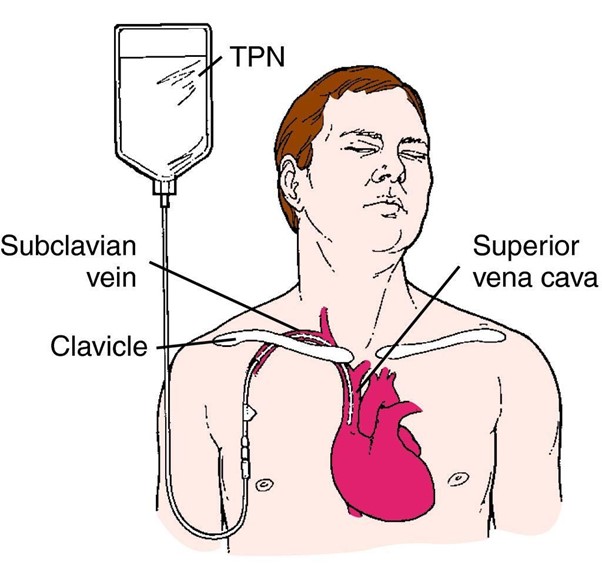When conducting diet teaching for a client diagnosed with hypokalaemia, which foods should the nurse encourage the client to eat?
Potatoes, bananas, and oranges.
Cranberry juice, butter, and hard candy.
Milk products, canned salmon, and fresh oysters.
Hard cheese, whole grain cereals, and dried vegetables.
The Correct Answer is A
Choice A
Potatoes, bananas, and oranges should be encouraged. Hypokalaemia refers to a lower than normal level of potassium in the blood. Potassium is an essential mineral that plays a crucial role in maintaining proper muscle function, nerve signalling, and fluid balance in the body. To address hypokalaemia, it's important to consume foods that are rich in potassium.
Choice B
Cranberry juice, butter, and hard candy. None of these foods are particularly high in potassium should not be encouraged. Cranberry juice is more commonly associated with urinary tract health, and butter and hard candy do not contribute significant amounts of potassium.
Choice C
Milk products, canned salmon, and fresh oysters should not be encouraged. While milk products contain some potassium, they are not as potent a source as other options. Canned salmon and fresh oysters do provide some potassium, but they are not as well-known for their potassium content as other foods like bananas and potatoes.
Choice D
Hard cheese, whole grain cereals, and dried vegetables should not be encouraged. These foods are not known for being particularly high in potassium. Hard cheese and whole grain cereals have limited potassium content, and dried vegetables, while containing some potassium, are not among the best sources.
Nursing Test Bank
Naxlex Comprehensive Predictor Exams
Related Questions
Correct Answer is C
Explanation
Choice A
Soft low-residue diet should not be recommended. This diet is often used for individuals with gastrointestinal issues and aims to reduce the bulk and frequency of bowel movements. It might not be necessary for this client's dental concerns.
Choice B
Pureed diet should not be recommended. A pureed diet involves blending foods to a smooth consistency, which is often recommended for individuals with severe difficulty swallowing or chewing. Since the client has no teeth but doesn't necessarily have difficulty swallowing, a pureed diet might be overly restrictive.
Choice C
Mechanical soft diet should not be recommended. mechanical soft diet consists of foods that are easy to chew and swallow, making it suitable for individuals with dental issues or difficulty chewing. It includes foods that are softer in texture, often cooked until they are tender and easy to manipulate with a fork or spoon. This type of diet would be beneficial for the client in question, as it accommodates his lack of teeth and ensures that he can consume a variety of foods without the need for extensive chewing.
Choice D
Full liquid diet should be recommended. A full liquid diet includes foods in liquid form, such as soups, milk, and juice. While it's easy to swallow, it might not provide the necessary variety and texture for the client's nutritional needs.
Correct Answer is ["A","B","C","E"]
Explanation
Choice A
Generalized nonpitting edema is correct. Nonpitting edema could indicate fluid retention, and it's important to assess for signs of fluid overload, electrolyte imbalances, or underlying cardiac issues.
Choice B
Hypoactive bowel sounds in all 4 quadrants is correct. Hypoactive bowel sounds could suggest gastrointestinal motility issues, which could be a sign of gastrointestinal complications related to TPN.
Choice C
Redness at intravenous site is correct. Redness at the intravenous site could be indicative of infection, infiltration, or irritation. It's important to assess for signs of infection and ensure proper IV site care.
Choice D
Urinary output greater than 30 ml per hour is incorrect. While increased urinary output could indicate adequate hydration, it's not typically a concerning finding unless there are other signs of fluid imbalance. Top of Form
Choice E
Frequent productive cough is correct. A frequent productive cough could indicate respiratory issues, including aspiration pneumonia, which can be a complication of TPN.

Whether you are a student looking to ace your exams or a practicing nurse seeking to enhance your expertise , our nursing education contents will empower you with the confidence and competence to make a difference in the lives of patients and become a respected leader in the healthcare field.
Visit Naxlex, invest in your future and unlock endless possibilities with our unparalleled nursing education contents today
Report Wrong Answer on the Current Question
Do you disagree with the answer? If yes, what is your expected answer? Explain.
Kindly be descriptive with the issue you are facing.
